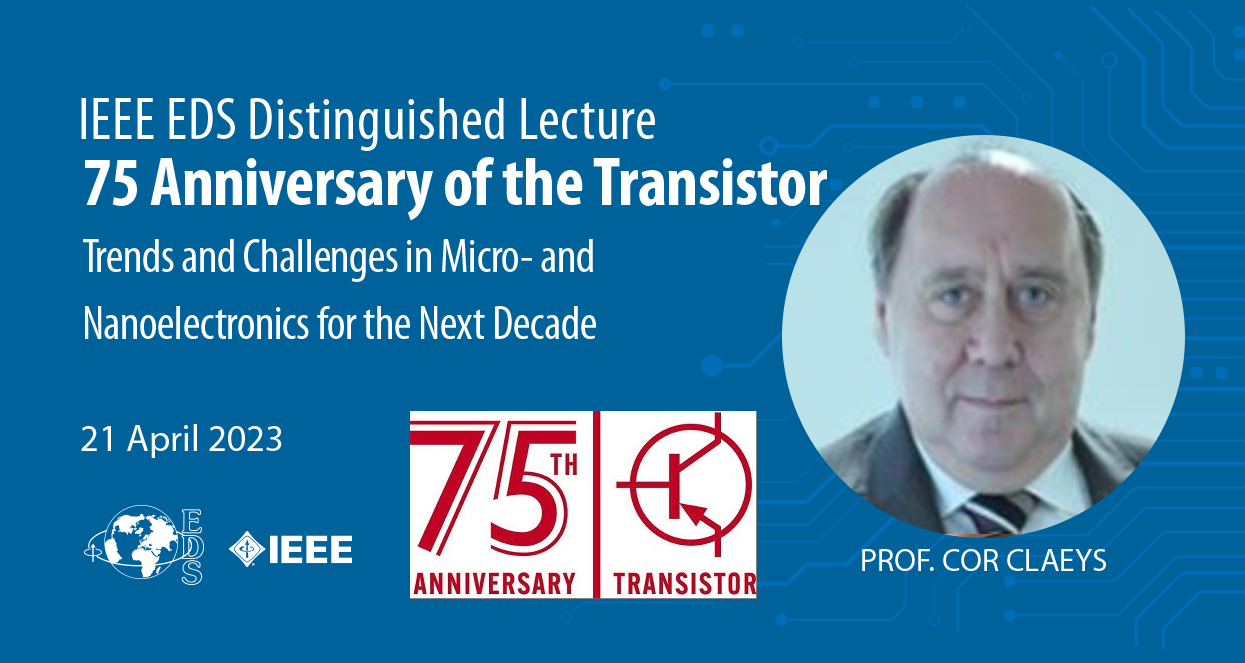75 Years of the Transistor – Trends and Challenges in Micro- and Nanoelectronics for the Next Decade by Prof. Cor Claeys
The EDS Germany Chapter and NanoP proudly presents Cor Claeys from KU Leuven, Belgium for a Distinguished Lecture on “75 Years of the Transistor – Trends and Challenges in Micro- and Nanoelectronics for the Next Decade”. The lecture will be held on 21st April 2023 at 2pm Berlin time. The Distiguished Lecture will be held in hybrid format, on site (TH Mittelhessen, Wiesenstraße 14, 35390 Gießen, Building A10, Room 6.20) and via Zoom. Login information provided before the event and requires registration. Interest participants please register via IEEE vTools by the following link: https://meetings.vtools.ieee.org/m/346991

Abstract:
Semiconductor technology knowns an exponential evolution in the last decades and is fully integrated in our everyday life. According to the Semiconductor Industry association (SIA) the global semiconductor industry sales reaches US$ 600 billion in 2022, corresponding with a shipment of more than 1.2 trillion components. This necessitated implementation of many novel materials, advanced design concepts and new transistor structures. Increased device performance and reduced power consumption, while maintaining a good manufacturability and yield performance without penalizing the cost/function, are driving microelectronic research towards 3-nm technologies. A large variety of device architectures such as FinFETs, TFETs, negative capacitance, Gate-All-Around, nanowires (NWs), nanosheets (NSs) in both horizontal or vertical configurations, CFET and Forksheet structures are extensively investigated for both logic and analog/RF building blocks enabling System-on-Chip (SoC) applications. Innovative heterogeneous Ge and III-V technologies on a Si platform are also gaining interest. Wide bandgap materials such as III-nitrides have a strong potential for RF and power parts. Increased system functionality and density is achieved by 3D integration based on Through Silicon Vias (TSV) and/or monolithic or 3D sequential integration on a Si substrate. The evolution, trends and challenges imposed on materials and devices are discussed for different integration technologies.
Cor Claeys Biography:
Cor Claeys is Professor at the KU Leuven (Belgium) since 1990. He was with imec, Leuven, Belgium from 1984 till 2016 and had different positions including, including and Director Strategic Relations. His main interests are semiconductor technology, device physics, low frequency noise phenomena, radiation effects and defect engineering. He is teaching a variety of short courses in different parts of the world (Europe, China, India and Brazil).
He co-edited books on “Low Temperature Electronics” and “Germanium-Based Technologies: From Materials to Devices” and wrote monographs on “Radiation Effects in Advanced Semiconductor Materials and Devices”, “Fundamental and Technological Aspects of Extended Defects in Germanium”, “Random Telegraph Signals in Semiconductor Devices” and “Metals in Silicon- and Germanium-Based Technologies: Origin, Characterization, Control and Electrical Impact”. Two books are translated in Chinese. He (co)authored 16 book chapters, over 1200 conference presentations and more than 1400 technical papers (of which more than 430 in peer-reviewed scientific journal). He is editor/co-editor of 70 Conference Proceedings.
Prof. Claeys has been the project investigator of a large variety of both European and bilateral research projects with industrial partners related to silicon technology, device physics and device applications for space activities and internet of things (e.g. infrared detectors, retina sensor, CCDs for medical applications etc.). Several international projects have been dealing with low frequency noise characterization of advanced semiconductor devices.
Prof. Claeys is a Fellow of the Electrochemical Society and of IEEE. He was Founder of the IEEE Electron Devices Benelux Chapter, Chair of the IEEE Benelux Section, elected Board of Governors Member and EDS Vice President for Chapters and Regions. He was EDS President in 2008-2009 and Division Director on the IEEE Board of Directors in 2012-2013. He is a recipient of the IEEE Third Millennium Medal and received the IEEE EDS Distinguished Service Award. He is a Distinguished Lecture of the IEEE Electron Devices Society. Within the Electrochemical Society, he was Chair of the Electronics & Photonics Division (2001-2003) . In 2004, he received the Electronics & Photonics Division Award. In 2016 he received the Semi China Special Recognition Award for outstanding involvement in the China Semiconductor Technology International Conference (CSTIC).
